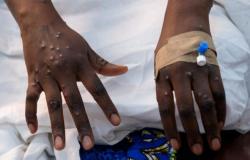The first autistic lawyer affected by deafness, Maïder Lecomte Dufresne has been pleading business law for 18 years. In addition to running her office on the Champs-Elysées, this enthusiast has trained in sophrology and does consulting for better acceptance of disabilities in the workplace. Encounter.
She is among the 40 French women selected by Forbes in the ranking of women in 2023, the year her agency DYSruptive, which offers “mental health advice to companies and law firms to support other firms and companies on the path to CSR , disability and inclusion”, received the Transfodroit public prize at the Grands prix de l’innovation des lawyers. Maïder Lecomte Dufresne is a sunny character who has turned his neuroatypicality (autism and ADHD) and his disability (deafness) into unfathomable strengths. Since her entry into business law, this Swiss army knife, with her flawless smile, intends to move the lines in small law firms as well as large CAC 40 companies. Founding partner of Hominum Juris, a law firm in the business law, she also manages the DYSruptive agency which supports firms and companies in the implementation or strengthening of their CSR policy and the inclusion of neuroatypical and disabled people, through impact conferences and partnerships strategic. Thanks to its policy, transposed from its knowledge in sophrology, it works for a more equitable society, where the assets of autistic intelligence are recognized and valued for the benefit of all. This super lawyer agreed to tell us a little more about her career.
AJ: What path led you to business law?
Maïder Lecomte Dufresne : I must say that in my case, we can speak of predestination. My grandpa despite himself taught me to have adventures. He was mentally retarded and stole from my grandmother’s purse, he taught me to search drawers, gave me his tricks. I was 3 or 4 years old. He had survived the concentration camps and had come back to 30 kg for 1m80, he had spent a year on a farm before returning to France, to get back on his feet. He put chickens in his pants, he used people’s contempt for mental disabilities to get by. Everything I have built is thanks to him.
That’s for my character. For the profession, it’s a different story. At 18, I had to leave home and was enrolled in law. I was very good at school but I was bored. I never made it to final year. In the end, I became a lawyer without my baccalaureate. With my capacity, I found myself in one of the largest criminal law firms in Seine-Saint-Denis. I knew how to type on the computer and the day after my arrival, my boss assigned me clients for 15 days. I took care of the Roma in Montreuil, I dealt with medical accidents, contaminated blood, criminal cases. At the same time, I was studying business law and gave birth to my first child. After my master’s degree and my DESS, I applied to firms and found myself doing an internship… after seven years in the job! I went to Darrois, then to Rambaud Martel, only political-financial. As it was complicated to get hired in this hyper-competitive specialty, I preferred to set up my own practice directly.
AJ: When did you become aware of your difference?
Maïder Lecomte Dufresne : As a child, I had diagnoses that already suggested autism, but my mother never returned to it. Of course, I saw the differences, my attention to the job really well done, the great responsibilities. This diagnosis of autism came back when I fell ill, shortly after setting up my practice and of course it influenced my practice. I trained in sophrology and completed a DU in Democracy and Health at the University of Patients at the Paris Medical School. I also did a DU in therapeutic patient education in Caen, to teach doctors to create a harmonious alliance with patients… Everything that a lawyer does in truth. Legal is only the guise of a relationship of human understanding, like medicine. All this to say that these openings caused by adversity have modified my practice of law. I also use it in my approaches with colleagues, in court, I am a litigator and I no longer plead at all in the same way as before, this is what I try to transmit in the courses that I provided at the EFB where I work on stress management. Between law and the practice of law, there is a very big difference and this is acquired with experience. I don’t do TedX, I don’t use an overhead projector or a ready-made model, I arrange the chairs in circles and for 1 hour 45 minutes we practice sophrology. The feedback is magical.
AJ: Is that why the Hominum Juris firm and the DYSruptive agency are two complementary activities?
Maïder Lecomte Dufresne : In business, I bring something else. When I carry out a legal audit, I help them continue to ensure that they are informed about the inclusion of people with mental illness and about psychosocial risks. Today, I am the first business law firm specializing in disability and CSR law. Many of my clients are neuro-atypical and seek to be supported by someone with the same profile. As an autistic person my brain goes on the weak signal, it looks for angles of attack different from what the judges are used to hearing.
AJ: Would you say that the profession has opened up to neuro-atypical and disabled people?
Maïder Lecomte Dufresne : I wouldn’t say that the profession is open, already because there is no census of disabled people, no specific tool. Some associations exist but depend on ordinal authorities. But in a way, the standard serves me because with ethics, we have invented what is best to protect our customers and protect ourselves too. Ethics is a very good tool: general conditions discounted, invoicing, customers sign everything, according to the text of the Consumer Code, we cannot give more than three months of payment deadlines, and there is the principle of adversarial ! On the other hand, today in companies with more than 200 employees, there is a disability referent, why does the lawyer not take up this position of disability referent, why are they external consultants when the dialogue is our core business? In our professions, we provide first aid in mental health, whether it concerns prevention, labor law, or criminal work. There are local mission referents in prison environments: why are lawyers not referents in prison environments when they are best placed to individualize advice? These are associations that do this today. My business law firm is the first in France dedicated to mental health in business (the legal aspect being associated with sophrology, therapeutic education and notions of first aid in mental health).
AJ: You were recognized by Forbes magazine, but also thanks to the Transfodroit prize, what does that mean to you?
Maïder Lecomte Dufresne : I didn’t expect it, it’s a recognition, not so much of what I do, but of what I can bring. It is also great visibility for people with disabilities, and I am happy at my humble level to contribute to restoring legitimacy to people with disabilities. After these distinctions, I was asked to participate in conferences to perhaps set up branch agreements, contracts to accommodate disability. I was invited to a conference on disability, autism and agriculture where I spoke with professionals at the European level. We recognize that a lawyer can be an expert in this area and I find this important for the profession.






